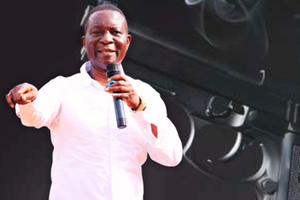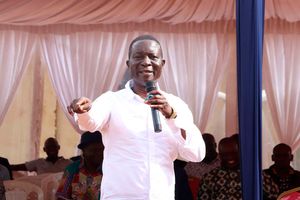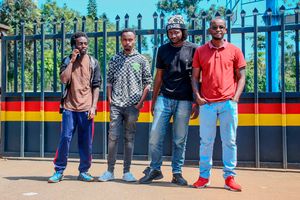
Charles Ong'ondo Were, MP for Kasipul, was killed at a red light. His killers escaped on a motorcycle.
The gangland-style killing of Kasipul MP Charles Ong’ondo Were has revived memories of a disturbing pattern of violent deaths targeting lawmakers over the years.
Mr Were was shot dead by an assailant on a motorbike on Wednesday night in Nairobi, a murder that has stunned the nation and revived fears over the safety of elected leaders.
Terming his death “targeted and premeditated,” police announced that the second-term lawmaker was gunned down when his car stopped at a red traffic light on Ngong road at 7:30 pm.
“Eyewitnesses have indicated that a motorcycle carrying a rider and a pillion passenger stopped alongside the car. The pillion passenger approached the vehicle and fired shots at the passenger side before jumping back onto the motorcycle and speeding away,” police spokesperson Muchiri Nyaga said.
The driver of the car and a male passenger, both unhurt, managed to rush the MP to Nairobi Hospital, where he was pronounced dead on arrival.
His death has, however, evoked painful memories of the past, where elected leaders have suffered at the hands of organised criminals, but their deaths remain a puzzle.
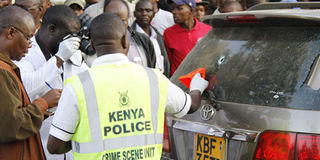
Forensic officers at the crime scene where Kabete MP George Muchai, his two bodyguards and his driver were shot dead on Kenyatta Avenue in Nairobi on February 7, 2015. PHOTO | JEFF ANGOTE | NATION MEDIA GROUP
In 2015, then-Kabete MP George Muchai was shot dead in a drive-by shooting in Nairobi.
In 2008, during the post-election violence, newly-elected Ainamoi MP David Kimutai Too and his Embakasi counterpart Mellitus Mugabe Were, were murdered days apart.
In 2001, Mr Tony Ndilinge, who had served as Kilome MP, was shot dead outside a bar in Githurai.
In 1985, Gem MP Horace Ongili Owiti was killed by a gang that raided his home.
Mr Tom Mboya, Mr JM Kariuki, Mr Robert Ouko and Mr Pio Gama Pinto, whose murder was the first assassination in independent Kenya, are other lawmakers murdered in cold blood.
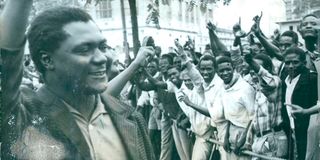
Tom Mboya is greeted by a jubilant crowds after the elections in 1963.
President William Ruto on Thursday told the police to conduct a thorough investigation into Mr Were’s death.
“Those responsible must be held to account. May God grant the family and the people of Kasipul strength to bear with the loss of Hon. Charles Ong’ondo Were,” President Ruto said.
The Raila Odinga-led ODM, Mr Were’s political party, also urged the police to investigate the shooting incident and bring the culprits to book, promising to issue a comprehensive statement later.
While most MPs are entitled to at least one bodyguard which they have the liberty to choose, rarely do some of them walk around with them exposing them to risks in the course of their duties.
Despite being entitled to one officer, an MP can request for more security depending on justified risk levels.
The leadership, however, enjoys more officers at their disposal as they also have GK vehicles in addition to others with civilian number plate registration.
The majority of the lawmakers walk without their security in town, some even mingling with the public at backstreets of Nairobi albeit the risks involved.
Some MPs also officially release their bodyguards on Thursdays opting to enjoy their weekend alone without the security personnel.
“I don’t walk with my security in Nairobi. I'm normally alone. I only use them when going to the constituency for crowd control purposes,” the MP said.
He pointed out that the majority of MPs drive themselves home in the evening after work while some only use the driver.
“The problem with having the bodyguard is that he will tell you he cannot use public means while armed. That means you have to drop him at his place first which still leaves you alone,” the MP said.
He added: “The drivers also don’t accept to drop the security before going home alone. To avoid that, we just have our guns and go home with the driver only.”
In the case of Mr Were, the bodyguard was among the passengers in the vehicle.
Bodyguards are supposed to ensure that the boss is safely home before retreating to their houses. The majority of MPs, however, choose to release their security in the evenings and drive home alone.
Rangwe MP Lilian Gogo, who described Mr Were as her brother-in-law, said that the s murdered legislator had reported threats to life to the DCI. She raised concern about the increased political violence in Homa Bay county even as she claimed the killers of Mr Were “are known”.
“We pray that this matter is conclusively addressed so that we know who murdered Ong’ondo Were,” Ms Gogo said.
As calls for investigations to unravel Mr Were’s killing heightened, questions still linger as to whether the police will unravel the mystery surrounding the death, or whether the MP’s killing will remain part of the statistics of lawmakers murdered in cold blood in the past years.
Only time will tell.
On February 7, 2015, then Kabete MP and renowned trade unionist, George Muchai, was killed within Nairobi’s Central Business District, alongside his two bodyguards–Samuel Kailikia and Samuel Matanta, and his driver, Stephen Wambugu.
The MP was driving home through Nairobi when his vehicle was rammed by another car at a roundabout between Uhuru Highway and Kenyatta Avenue.
The assailants shot the four at close range.
Director of Public Prosecutions (DPP) has since closed its case against seven suspects after presenting more than 37 witnesses in the murder trial.
Trial High Court Judge Kanyi Kimondo, however, directed all parties to file and serve their final submissions ahead of setting a judgment date.
He scheduled a meeting for June 24 to confirm compliance.
The seven accused— Eric Isabwa alias Chairman, Raphael Kimani alias Kim Butcher, Mustapha Kimani alias Musto, Stephen Astiva alias Chokore, Jane Wanjiru alias Shiro, Margaret Njeri, and Simon Wambugu — denied the murder charge.
At the height of the 2007/2008 post-election violence, on January 31, 2008, violence broke out following the murder of then Ainamoi MP David Kimutai Too (ODM).
Two days earlier on January 29, 2008, his Embakasi counterpart Mellitus Mugabe Were (ODM) had also been gunned down in the city, sparking huge protests.
Mr Too was shot dead by Andrew Moache, a policeman.
He was killed along with his girlfriend, policewoman Eunice Chepkwony, who was also dating the police officer who shot them, Andrew Moache, according to the official account of the incident.
It was found by account of witnesses during the court cases that Eunice and Too were parked in West Indies Estate in Eldoret Town.
Andrew while trailing them on his government-issued motorbike, got into a confrontation with Eunice outside the vehicle and shot her in what turned out to be self-defense.
He then shot Too who emerged from the car with a gun.
Eunice was shot in the thigh and chest while Too was shot in the shoulders, and chest and received a fatal shot to the head.
The MP died right away, and Eunice died while undergoing treatment at Moi Teaching and Referral Hospital, Eldoret.
The case cast a spotlight on former Chief Justice David Maraga, after the late MP’s family filed a petition against Mr Maraga’s appointment as Chief Justice, arguing he lacked the competence to head the Judiciary.
“I was dealing with two defences in this case; one of self-defence and the other of provocation. If I applied the self-defence option I would have acquitted that man and he would have gone home,” the former CJ said in his defence.
Justice Maraga said he opted for the provocation option, which led to the manslaughter charge against the police officer.
In Mr Mugabe Were’s case, police concluded the investigation in 2008 and four persons were subsequently charged with the murder, all of whom were in custody at that time.
The MP had been gunned down at his home in Woodley Estate, Nairobi.
A number of witnesses appeared in court during trial proceedings, which encountered significant delays with repeated adjournments and changes in the presiding judges.
The criminal proceedings were mishandled to the point that the judge in the case declared a mistrial in November 2011 and ordered that the case be retried.
The retrial commenced in December 2011 and continued in 2012.
The High Court of Kenya concluded the first instance proceedings against the suspected murderers of Mr Were on February 10, 2015, convicting three of the suspects to the death penalty and acquitting a fourth person.
Mr Were’s widow, Ms Agnes Wairimu said justice had been done.
James Omondi alias Castro, Wycliffe Walimbwa Simiyu alias Zimbo and Paul Otieno alias Baba murdered the MP, Mr Justice Luka Kimaru ruled.
The fourth suspect, Ms Mary Muthoni Wamaitha, was acquitted on grounds that she did not participate in the murder and was only a victim of circumstances being the wife of Paul Otieno, and that the guns used were recovered in their house.
Another legislator, a victim of murder is former Kilome MP Tony Ndilinge.
He was 47 when he was shot outside a bar in Githurai on August 1, 2001. Prior to his death, Mr Ndilinge had complained to Parliament and the police that his life was in danger and that he was being followed.
The lawmaker who had been representing the people of Kilome from 1992 was shot twice in the head. To date, the perpetrators have never been known.
He had been labelled a rebel by the ruling Kenya African National Union Party for his criticism of the government that cost him his position as an assistant minister in 1999.
He had however reaffirmed his allegiance to the then President Daniel arap Moi and campaigned actively for the party during a by-election just a week before he was killed.
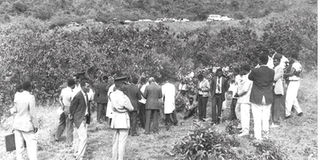
The scene where Dr Ouko’s body was found near Koru. TJRC says there are two theories that could explain the Foreign minister’s death. PHOTO/FILE
Former Kisumu Town MP Robert Ouko, a former Foreign Affairs Minister’s death is one of the most intriguing and remains unsolved to date. His charred remains were found on February 13, 1990, in Koru, Muhoroni.
At the time of his death, he was also serving as Foreign Affairs Minister.
President Daniel arap Moi established a commission of inquiry into the murder, chaired by Justice Evans Gicheru. Over the course of 13 months, the commission held nearly 250 sessions and recorded testimonies from 176 witnesses.
Notable individuals named as suspects included Industry Minister Nicholas Biwott, Hezekiah Oyugi—the Permanent Secretary in the Office of the President—and Jonah Anguka, then the Nakuru District Commissioner.
However, President Moi eventually dissolved the commission, claiming that witnesses were spreading unfounded rumours.
Mr Tom Mboya, then Nairobi Central MP, now Kamukunji, was shot by Isaac Nahashon Njenga Njoroge on July 5,1969 along Government Road (current Moi Avenue) as he came from a chemist.
He was just 39 years old and serving as Minister for Economic Planning and Development and Nairobi Central MP (currently Kamukunji constituency).
Nahashon Njenga was sentenced to death and hanged on the morning of November 8, 1969.
Another case is that of Josiah Mwangi (JM) Kariuki, former Nyandarua North MP whose body was found on March 2, 1975, in Ngong forest by a young herder with his eyes gouged out and face burnt with acid.
His murder remains unsolved 50 years later. The young boy, Musaite ole Tunta who found his remains, died in 2023 and was among the last few witnesses.
Multiple attempts to investigate the murder have yielded no results, with a report by the parliamentary select committee—which had outlined key leads for future inquiries—ultimately ending up shelved in the parliamentary library and archives.
On May 27, 1985, an armed gang struck at the home of Gem MP Horace Ongili Owiti in Siaya. They attacked him with machetes and batons, stabbed him with knives and carried his lifeless body into a nearby maize plantation. They did not steal anything. His car, parked outside the house, was intact.
The killing had the hallmarks of a cold-blooded murder, as theft was immediately struck off as a possible motive.
The murder was preceded by some violent incidents targeting a bakery he owned in Siaya Town, as well as several attacks on his political agents. One of them had been murdered the year before, soon after a local by-election which Owiti had won.
An investigation revealed a chilling plan to eliminate a political opponent and pointed at the immediate former area MP Otieno Ambala who became a top suspect.
He had withdrawn large amounts of money in the days before the death and had also met key suspects.
As the horrible saga unfolded, Ambala was arrested and charged with the murder, along with six other suspects. But after a few months in jail, he collapsed and died of a heart attack. Some people claimed he too was assassinated to shield the real killers.
Mr Pio Gama Pinto (specially elected member of the House of Representatives) had driven out of his house in Parklands on February 24, 1965 with his daughter but before he could even leave his driveway, he was shot dead by two men.
Kisilu Mutua, the man accused of killing Pio Gama Pinto spent 36 years behind bars but still maintained his innocence in the Pinto murder. He died aged 79 in 2023.
During the Mau Mau uprising, Pinto was actively involved in sourcing weapons for the movement. He was instrumental in organizing legal representation for the Kapenguria Six—Jomo Kenyatta, Achieng Oneko, Kung’u Karumba, Bildad Kaggia, Paul Ngei, and Fred Kubai.
His political activism resulted in his arrest and detention in 1954, making him one of the few non-Africans to be imprisoned during the State of Emergency.
Reporting by Justus Ochieng, Samwel Owino and Jackline Macharia.

